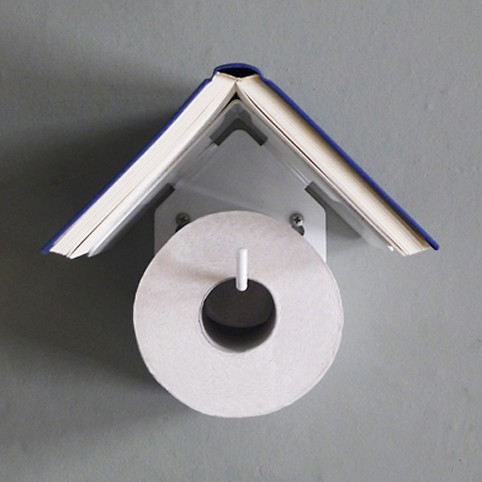Books & Culture
The Self at the Bottom of the Toilet Bowl
On the literature of shit

People were talking about Don DeLillo’s Underworld, and I wanted to contribute. My feeling is, if you’ve read a giant novel, you should be able to get conversational credit for it. The problem is that in spite of being an avid reader, I have terrible recall. Even basic plot points tend to vanish from my memory after about a year. So it seemed to be with Underworld, which I must have read a decade before. I stood there trying to muster a coherent assessment from the muddled detritus of my memory — baseball, New York, postmodern… nothing here was going to give me any talking points.
My feeling is, if you’ve read a giant novel, you should be able to get conversational credit for it.
Then I realized I did remember something. Something specific.
“Remember when that guy goes on a honeymoon with his wife and the farther they travel across Europe, the worse his shit stinks?”
I didn’t realize how strange that comment sounded until after the words were already out. Yes, the others remembered, yes they even laughed a little, but uncomfortable questions remained. Why had I brought up that plot point in particular? A bit of backstory meant to characterize, salient neither to the plot nor to our conversation. Things got stranger still when it became clear to everyone, not least myself, that I had nothing more to say about the novel. The description of Marvin Lundy’s excrement was literally the only thing I remembered about the book.
Sheepishly, I retreated. But that wasn’t the end; it happened again, this time in a conversation about David Mitchell’s lovely autobiographical novel Black Swan Green. This time, I did remember a few things about the book. But three words kept hovering under the surface of my thoughts: good clean crap. I resisted saying them. Then I went home and put those words into an Amazon “look inside” search box for the novel.
This time, I did remember a few things about the book. But three words kept hovering under the surface of my thoughts: ‘good clean crap.’
The phrase good clean crap does in fact appear in the novel, in a scene where protagonist Jason is listening in on a tense family conversation from the bathroom. It’s a thousand times more of a throwaway line than Don DeLillo’s shit reverie. And yet, I’d remembered it perfectly. The implications began to dawn on me. I tried to think of other shit-in-literature moments. Within the next thirty seconds I had unearthed:
· “Big Boy,” the eponymous un-flushable turd in one of David Sedaris’ stories from Me Talk Pretty One Day.
· Humbert Humbert’s TMI revelation, right after he has sex with Lolita for the first time: “I was unbathed, unshaven, and had had no bowel movement.”
· The recovering alcoholic in Infinite Jest who testifies in an AA meeting that, after years of diarrhea, he can finally produce a well-formed turd.
The more I paid attention to shit in the books I read, the more I realized I have some kind of cursed superpower. If a book doesn’t have shit in it, I won’t remember it. If it has shit in it, I won’t ever forget it.
Freud has something to say about this, of course, but it’s not pretty. I’m stuck in the anal stage, a toddler refusing to give up what’s in his diaper. My fixation on poop, however unwitting, represents an overexertion of the superego, a ridiculous ploy to control the chaos around me — and yes, I do love control. (“I like to experience nature inside museums,” I recently told a friend.) Hard as this self-knowledge is to bear, I know that willing subconscious obsessions away only makes them worse. That’s why I decided to face the textual toilet bowl and bring the sublimated to the surface. I began, in other words, to look at shit in novels analytically, re-reading the scenes in question with an eye (and nose) towards their formal and thematic functions.
I know that willing subconscious obsessions away only makes them worse. That’s why I decided to face the textual toilet bowl and bring the sublimated to the surface.
First, the obvious, but it bears stating: The ratio of shit to not-shit is much greater in real life than it is in a novel. Meaning, whether or not your “erotogenicity” is fixed in the “anal zone” — as Freud would say mine is — by necessity you end up thinking about shit more often than you read about it. As E.M. Forster observes in Aspects of the Novel, we spend our lives eating to keep from going hungry, but characters in novels seldom eat for such prosaic reasons. Instead, food consumption in novels tends away from the naturalistic and toward the representational. So it is with the other side of consumption. If there is shit in a novel, chances are it’s not there to give a factually accurate portrayal of a character’s day. It’s meant to mean something. Even Joyce’s seemingly-banal description of Leopold Bloom on the toilet with a newspaper, letting “his bowels to ease themselves quietly as he read…that slight constipation of yesterday quite gone,” reads to me as Joyce commenting on the reader-as-consumer. As anyone who has read any part of Ulysses can attest, you can’t passively consume the text; you have to produce your own knowledge (shit).
If there is shit in a novel, chances are it’s not there to give a factually accurate portrayal of a character’s day. It’s meant to mean something.
I get ahead of myself. Most literary deployments of shit function as characterization rather than meta-commentary. This characterization, more often than not, centers around control. Take young anal retentive Karl Ove Knausgaard, discovering (in Book Three of My Struggle) that he can hold in his own excrement: “I had such a fantastic feeling in my body if I didn’t let nature take its course, if I squeezed the muscles in my butt together as hard as I could and, as it were, forced the shit back where it came from.”
You don’t need 50 minutes on a couch to speculate on the source of Karl’s control issues: his domineering, verbally abusive father. Since young Karl spends his days painfully aware of his father’s every motion, calibrating his actions according to his father’s moods, he can claim little control over his own life. Except, that is, in one area. When the shit hits the fan and childhood becomes too overwhelming, we control what we have.
As with young Karl’s fixations, a young character’s relationship to shit can tell us a lot about the kind of adult they’ll become. Even before Kevin, the titular character in Lionel Shriver’s novel We Need to Talk About Kevin, murders nine of his high school classmates, we know he’s bad because of the way he manipulates his poop. Kevin refuses to be potty-trained; his mother, Eva, is still changing his diapers at age six. Kevin times his next bowel movement for the minutes after Eva has finished cleaning his first. “Kevin…had learned to form a weapon from shit,” we learn, foreshadowing Kevin’s later obsession with another kind of weapon.
Even before Kevin, the titular character in Lionel Shriver’s We Need to Talk About Kevin, murders nine of his high school classmates, we know he’s bad because of the way he manipulates his poop.
After one maliciously-timed diaper dump, Eva becomes so upset that she literally throws her son across the room. It is the only instance of physical abuse in his childhood, and she later wonders if it made him what he’d become. In the moment, however, she feels blissfully free, finally able to admit that she doesn’t love her son: “When hoisting Kevin’s body in that fluid adrenal lift, for once I’d felt graceful, because at last there was an unmediated confluence between what I felt and what I did.” This confluence is the privilege of childhood, when you can say what you feel without consequence. The time before you have to hide your shit.
Growing out of childhood involves learning to manage our shit in civilized ways. Freud believed that a key point in the evolution of both crawling children and humans as a species came when raised our noses from the ground. Civilized people walk on two legs, far removed from the stench of the earth. Thus when shit crops up in novels it often signals a return to a pre-civilized life. In Gary Shtyengart’s dystopian fiction Super Sad True Love Story, a near-future New York City dissolves into chaos: “By the razor-wired fence delineating a failed luxury-condo development, a drunk in a frilly guayabera shirt pulled down his pants and began to evacuate.”
The links between shit and civilization take on more complex dimensions in a post-colonial context. Obinze, one protagonist of Chimamanda Adichie’s novel Americanah, immigrates from Nigeria to London, finding work as a janitor for an estate agent. The office toilets aren’t as dirty as those in Nigeria, which makes Obinze think the British are more civilized. But then he sees “a mound of shit on the toilet lid, solid, tapering, centered as though it had been carefully arranged.” Whether or not the shit was left there for him specifically, Obinze finds symbolic connections between it and his experience as an African immigrant struggling to make his way in 21st century London. No one will overtly tell Obinze that he is less than a white Brit; still, the racism he encounters seethes below the surface of his daily life. Now that the shit is on top of the toilet, Obinze feels the truth of his social status. As with Eva’s flinging of a dirty-diapered Kevin across the room, shit breaks through the veneer of civilization to join action and intent.
No one understands shit’s antagonistic relationship with civilization more than the talking turd in Jonathan Franzen’s The Corrections. The talking turd (which has to be either an homage to or a rip-off of South Park’s Mr. Hankey) is an hallucination of the dementia-riddled Alfred, a retired railroad engineer on a cruise ship vacation. Early in the morning in the ship’s cramped bathroom, Alfred and the turd debate the finer points of civilization. “‘Me, personally, I am opposed to all strictures,’” the turd says. “‘If you feel it, let it rip. If you want it, go for it.’” “‘Civilization depends on restraint!’” Alfred protests. The turd counters by accusing Alfred of complicity with the erasure of people deemed “uncivilized,” from Italians to African Americans.
No one understands shit’s antagonistic relationship with civilization more than the talking turd in Jonathan Franzen’s The Corrections.
It is as if Franzen’s talking turd has read Dominique Laporte’s 1978 History of Shit. Laporte’s delightfully provocative (if not very historically rigorous) treatise focuses on a key moment in the antagonism between shit and civilization: a 16th century French edict requiring “cesspools” to be confined to private dwellings. That people couldn’t shit in the streets anymore would seem to be a boon, hygienically speaking, but Laporte finds a sinister motive. In their efforts to cleanse the streets, the French government and others undergoing similar initiatives catalyzed a discourse of purity that has dogged modernity since. “This compulsive purification makes most sense when understood not as a step forward in history, but as a regression that paralleled the Renaissance’s return to the values of antiquity in other spheres,” Laporte writes.
Laporte’s theory of forced linguistic cleansing makes sense in light of Francois Rabelais’ famously lewd series of novels, The Life of Gargantua and of Pantagruel. Rabelais published his ribald, scatological prose only a few years before the French cesspool edict; almost five centuries later, his glee in grossing us out still feels deeply radical, lending weight to Laporte’s theory of the irrevocably diminishing effect of removing disgust from language. It’s difficult to imagine a birth scene as unapologetically disgusting as the one that follows appearing in print today.
It’s difficult to imagine a birth scene as unapologetically disgusting as the one that follows appearing in print today.
Pregnant Gargamelle, Gargantua’s mother, is enjoying a light lunch of sixteen barrels of tripe when she mistakes her understandable gastrointestinal discomfort for labor’s arrival. Midwives are summoned: “Groping around underneath, they found some fleshy excrescences, which stank, and they were sure this was the baby. But in fact it was her asshole, which was falling off, because the right intestine (which people call the ass gut) had gone slack, from too much guzzling of tripe, as we have already explained.”
Despite the proffered explanations, I’m still not sure I understand how Gargamelle’s ass gut went slack. Anyway, Rabelais doesn’t seem to have been striving for anatomical accuracy. Gargantua ends up being born up instead of down, emerging out of his mother’s ear. It’s a reversal that signals the text’s own radical intentions. Gargantua and Pantagruel was intended to upend the sacred cows of the French monarchy. Bolstering Laporte’s claim that the privatization of shit scrubbed language of excess, Rabelais’ novel series features hundreds of made-up words. The scatological is radical here, a way to mock the textual censors while reminding them that everybody poops.
As Rabelais suggests, shitting and giving birth both require releasing control. Expectant mothers are often counseled not to be afraid to poop during birth; still, for many mothers the association of birth and shit is fraught. “All through my labor, I could not shit at all, as it was keenly clear to me that letting go of the shit would mean the total disintegration of my perineum, anus, and vagina, all at once,” writes Maggie Nelson in her “auto-theoretical” memoir The Argonauts. “I also knew that if, or when, I could let go of the shit, the baby would probably come out. But to do so would mean falling forever, going to pieces.”
Nelson’s realization that she must cede control over both her shit and her baby resonates metaphorically with the birth of her memoir itself. The Argonauts is at once deeply intimate and pervasively analytical, requiring Nelson to extend the most vulnerable parts of herself to her readers. This project is a feminist one, part of Nelson’s efforts to reclaim motherhood as a space for theorizing. To do this she must be willing to give up the masculine control of the sphincter, to go to pieces, to birth the shit as well as the baby.
Nelson’s realization that she must cede control over both her shit and her baby resonates metaphorically with the birth of her memoir itself.
The deepest connection Laporte makes in his History of Shit links the privatization of shitting to the construction of a self. By bringing shit indoors, Laporte argues, the French government established its place in the domestic sphere. As bathrooms evolved and Western excretory habits became increasingly private, the doors separating the toilet from the rest of the house delineated the boundaries between self and other. For Laporte’s communal ethics, this separation speaks to the disintegration of the public sphere. Taken positively, it promotes the identification and solidification of an individual’s self.
The inextricability of shitting and selfhood must explain why so much literary shit exists to help characters know themselves better. Joey, in Franzen’s Freedom (what is it with Franzen and shit?), has a hapless adolescent’s haziness of self; he is so indecisive that goes a secret vacation with one woman while being engaged to another. On this trip he accidentally swallows his engagement ring. The only way out of this predicament, he discovers, is through. Hunched over the toilet handling his own turds, Joey reaches a turning point in his self-conception: “He was the person who’d handled his own shit to get his wedding ring back…there was something comforting and liberating about being an actual definite someone, rather than a collection of contradictory potential someones.”
The inextricability of shitting and selfhood must explain why so much literary shit exists to help characters know themselves better.
There’s something irrevocable about the self at the bottom of the toilet bowl. It can be difficult to face this self, but it can also be comforting. This is the case for Shadrack, the traumatized WWI vet in Toni Morrison’s Sula. Back from the war, addled with PTSD, Shadrack wanders rural Ohio looking for home. He feels unseen by the white people he encounters, who are confused by his behavior and place him in a jail cell. That’s where he sees his mirror image in the toilet: “There in the toilet water he saw a grave black face. A black so definite, so unequivocal, it astonished him. He had been harboring a skittish apprehension that he was not real — that he didn’t exist at all. But when the blackness greeted him with its indisputable presence, he wanted nothing more.”
It’s not that Shadrack has low self-esteem, that he is seeing himself as shit. Instead, looking into the toilet confirms his blackness, and his blackness confirms his realness. In this novel about the close-knit African American community of Medallion, Ohio, blackness acts as an anchor, a self to hold onto amid Jim Crow-era white mistreatment and neglect.
If the self at the bottom of the toilet bowl seems the truest, it’s because shit, in all of its stinky solidity, gets to the vulnerable core of who we are. In David Foster Wallace’s Infinite Jest, the alcoholics attending an AA meeting for the first time don’t respond emotionally to vague platitudes about hope. Then a veteran member, a hyperbolically accented Irish man, gets up to testify about his own recovery journey, specifically about how being sober allowed him to finally produce a solid shit: “T’were a tard in t’loo. A rail tard. T’were farm an’ teppered an’ aiver so jaintly aitched. T’luked… conestroocted instaid’ve sprayed.”
If the self at the bottom of the toilet bowl seems the truest, it’s because shit, in all of its stinky solidity, gets to the vulnerable core of who we are.
Meanwhile, the crowd is enchanted: “the lightless eyes of certain palsied back-row newcomers widen with a very private Identification and possible hope, hardly daring to imagine…A certain Message has been Carried.” The Irishman has intuited the way to get past the superficial rhetoric of motivation to arrive at the real reason to recover, the truth of which lies in the texture of his very shit.
Despite the many shit scenes I’ve discussed (and there are more!), the fact remains that books acknowledging the existence of shit are the outliers. It’s the rare book that is willing to face the farshtinkener, the Yiddish word Marvin Lundy uses to describe the smell of his bowel movements in Underworld, the book that first revealed my anal fixation. The subconscious propriety that keeps authors from writing shit into their work actually reveals the power it retains. “We dare not speak about shit,” writes Laporte. “But, since the beginning of time, no other subject — not even sex — has caused us to speak so much.” Consider that when we talk about control, or civilization, or the chaos that attends birth and death, we are in some ways talking about shit. If the smell is there anyway, why cover it with Poo-Pourri? Why not lower your nose to the earth and sniff?









